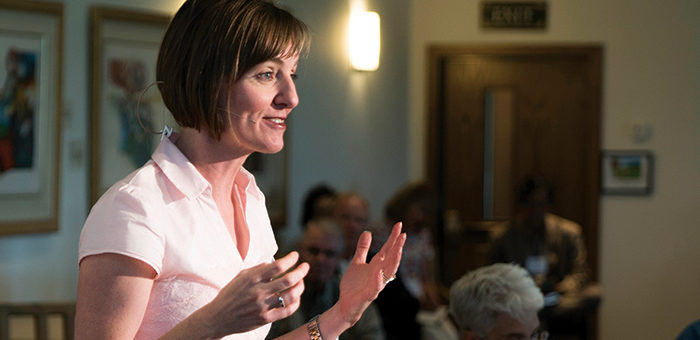Elisabeth A. Nesbit Sbanotto joined the faculty of Denver Seminary in 2011 as assistant professor of counseling. Prior to Denver Seminary, she was an assistant professor at John Brown University and maintained a private counseling practice in Fayetteville, Arkansas. Nesbit Sbanotto co-authored “Effective Generational Ministry” with Craig Blomberg. She received her B.A. in interpersonal communication from the University of Northern Iowa, an M.A. in counseling from Denver Seminary, and a Ph.D. in counselor education from the University of Arkansas.

Like members of a family or parts of the body, Baby Boomers, Generation Xers, and Millennials each contributes something unique and valuable. Similarly, each member needs to be understood for its individual identity, while also being appreciated for what it contributes to the whole.
Of course, not everyone fits exactly into the mold of their generation. But understanding generational characteristics gives a baseline tool for pastoral counsel and ministry development and helps people of different generations bridge gaps that otherwise may have been missed connections.
Baby Boomers
Context. Baby Boomers are named for the “baby boom” that took place after World War II in 1946 and lasted until 1964. Boomers entered the world at a time of economic growth, social expansion, and personal development. By the time they entered the workforce, there were more jobs than people; the world was theirs for the taking!
Baby Boomers are the last generation who predominantly grew up in a “traditional” household, with two parents who stayed married, a bread-winning father and a homemaking mother. They value deferred gratification, loyalty, economic growth and security, and personal responsibility.
Boomers believed that if they worked hard enough for long enough, they could create a life of significantly greater comfort and options for their children than they had. They embraced capitalism, democracy and the Protestant work ethic, as not just American values but as “Christian” values, blurring the lines between faith and politics.
Materialism — couched under the labels of “work ethic” and “personal growth” — caused many to see their identity defined by their job titles, professional accomplishments or materialistic gains. For the first time in American history, personal and professional development trumped loyalty to family commitments, and divorce became more commonplace, even among Christians.
Connection. As many Boomers reached young adulthood they explored faith and religion apart from their families, choosing that which ultimately felt personally right for them (Joshua 24:15).
Baby Boomers sought to create, build and redefine their place in American society reflecting God’s endowment to people to be creators and innovators. They sought to bring social change by challenging racism and other social injustices on a large scale, reflecting God’s heart for justice and equality among all people.
As Boomers enter their retirement years, many find themselves caring for aging parents, others are caring for grandchildren, and some are functionally family-less due to divorce, death or geographic distance from loved ones. For many, now is a time to discover their identity apart from their paid work, and in this some face an existential crisis of meaning, purpose and legacy.
The Church must find ways to help Boomers process this new stage of life, and to utilize Boomers as mentors, teachers and adoptive grandparents within their community, mutually benefiting all involved.
Generation Xers
Context. The lost child of the generations, Generation Xers were born between 1965 and 1981 and were named to reflect their unknown identity. Just as in algebra, the X marks a mystery value, something to be figured out, or something not readily apparent or understood.
The smallest of the generations, Xers entered American society at a time of economic, social and political upheaval. Additionally, Xers were raised at a time when children were often seen as a hindrance to their parents’ personal and professional development. This “latchkey generation” comes from the highest percentage of divorced homes, and expresses the least desire to marry or have children of any generation.
Generation Xers value independence, skepticism, grass-roots efforts, and tending to their own sphere of influence. Their childhood experiences led many to believe that the only way to succeed in the world was by their own efforts, merits and creativity.
The family as an institution could no longer be trusted, let alone the presidency, or the Church (think Nixon, Swaggart and Bakker). Societal heroes were a thing of the past and the American dream was just that: a dream. Entering into a saturated workforce meant the Boomers’ values such as paying one’s dues and longevity left Xers at a disadvantage, and therefore values of creativity, resourcefulness and entrepreneurial effort took their place.
The world felt big to this small cohort, so rather than attempting to change the world with picket signs and sit-ins, they turned to neighborhood gardens, local fundraisers and cancer walks in honor of a friend’s mom who died, believing that small but direct efforts can ripple into something bigger.
Connection. Xers sought to find their own way in a culture, and a Church, that were not designed for them. They embraced postmodernism and relativism, and valued personalized faith, defining themselves as spiritual, rather than religiously affiliated.
As believers, they reflect Paul’s exhortation to the Corinthians (1 Corinthians 3:4-9) and challenge affiliation along mere denominational lines. Xers seek justification for the ongoing existence of rules that they see as pharisaical, inviting the Church to reflect on what is biblical, rather than cultural. Xers value community and connection with those who actively engage with the least of these in our society.
The Church has the opportunity to be the chosen family of a generation whose families are broken or absent, and to engage the innovative, resourceful and creative approaches that Xers can bring.
Millennials
Context. As the largest generation in American history — now expected to reach 90 million by 2020 due to immigration — Millennials brought generational culture into American vocabulary. Born between 1982 and 2001, Millennials were named for their historic location as the first generation to reach adulthood in the new millennium.
The most diverse generation in history, Millennials were taught to value the inclusion of different people, thoughts and perspectives from the time they were introduced to Sesame Street, Barney, and Dora the Explorer. To this generation, differences are to be praised and honored.
Millennials were also taught that they could do or be anything they choose (and got a sticker for any attempts at getting there). They enter the workplace and Church with an expectation of acceptance, promotion and immediate success. This is not to be mistaken for entitlement, which assumes that one person is better than another and therefore more deserving. Instead, like most of us, they expect that what has been their lived experience in the past is likely to be the pattern for the future.
There is an idealism and a hope that this cohort brings that is not found in previous generations, which can be both naïve and inspiring, and should not be squashed.
Connection. Millennials are the least religiously and spiritually interested of the three adult generations. Their world is one of constant movement, information and change where everyone has something to sell, and the Church is seen as no different. Discipleship, not simply conversion, must be the Church’s focus.
Millennials remind the Church that the gospel is about relationship, restoration and unity, and any attempts at evangelism and discipleship must begin with these things. They challenge hypocrisy and value expressions of faith that are messy, in process, and include the opportunity to express deep doubt.
In “You Lost Me,” David Kinnaman offers an analogy of Millennials to Daniel and his friends in Babylon. The Church has the exciting challenge of training, equipping and launching this generation in a way that enables them to engage the culture from the inside.
Millennials need the Church to ground them in an ultimate Truth that the world cannot offer, and launch them to engage the world for Jesus, pursuing a life that is lived for something greater than themselves.
Better Together
Every generation is fallen and in need of redemption. And every generation is fiercely loved and pursued by the Creator. The strengths of one generation are not holier than those of another. And the sins of one generation are no less forgivable than another. Our challenge and comfort is to come together in understanding and appreciation of one another, so that we may learn to love and support each other better, and therefore present a fuller picture of the gospel to a divided world.
This article originally appeared in Evangelicals magazine.



 View All Articles
View All Articles 





















